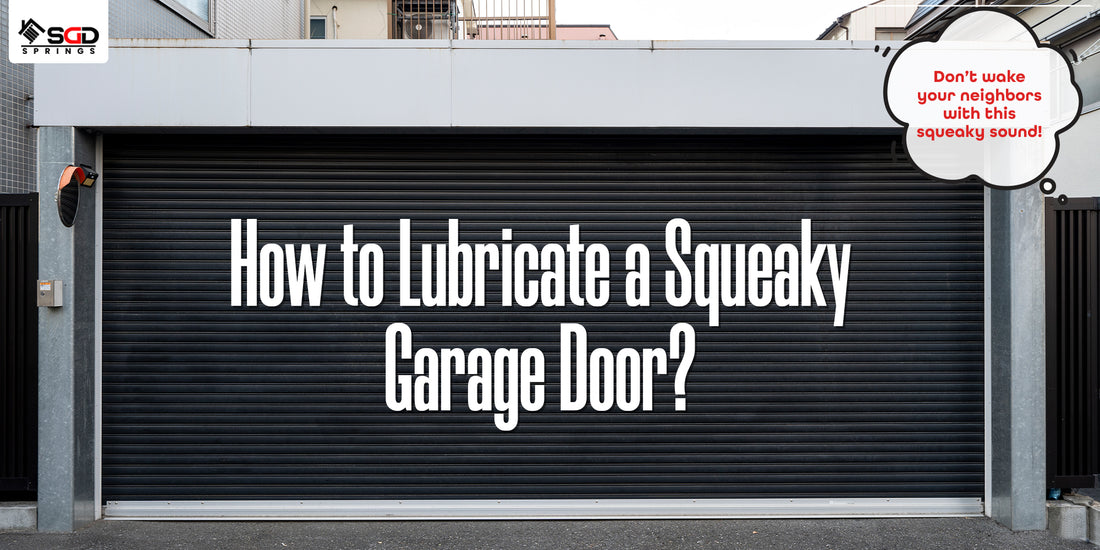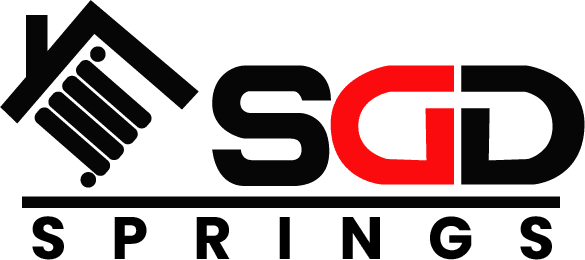
How to Lubricate a Squeaky Garage Door?
Share
Does your garage door make a squeaky sound when opening or closing it? These noises can be a nuisance and disturb your whole neighborhood and your family. It can be easily solved by properly maintaining it and it also doesn't take much of your time or money.
Lubricating your garage door is a simple task you can do yourself with the right tools and a little time. In this blog, we have mentioned step-wise how to lubricate your garage door properly so that it works quietly and efficiently.
Why Lubrication is Important?
After a while, your garage parts start making sound due to excess friction. Lubricating your garage door helps reduce friction between moving parts also preventing wear and tear. Regular lubrication also helps to extend the lifespan of your garage door components and reduces noise so that it opens and closes smoothly.
Tools You Should Get

- Garage door lubricant: A silicone-based spray or white lithium grease. Avoid using WD-40 as it’s more of a cleaner than a lubricant.
- Ladder: To reach the higher parts of the garage door.
- Cloth or rag: To wipe away dirt, debris, and excess lubricant.
Pre-Lubrication Maintenance Checklist

Before you start lubricating your garage door, it's essential to follow these steps:
1. Inspect the Door
Check for any visible damage or wear, such as cracks in the door panels or loose bolts and screws.
2. Clean the Tracks
Wipe down the tracks with a cloth to remove dirt, debris, and any built-up grime. This helps the rollers move smoothly along the tracks.
3. Tighten Hardware
Check all nuts, bolts, and screws are secure, especially those on hinges.
4. Safety First
Before starting, make sure your garage door is closed and disconnected from the opener. This prevents any accidental movement while you are working.
Once done, you are ready to get the work started.
Step-by-Step Guide to Lubricating Your Garage Door
Step 1: Lubricate the Hinges
Use your lubricant to spray the hinges that connect the sections of the garage door. These hinges help the door bend and fold as it moves. Be sure to lubricate where the hinge pivots. Open and close the door manually a few times to spread the lubricant into the joints.
Step 2: Lubricate the Rollers
Rollers are the wheels that move along the tracks. Metal rollers with ball bearings also need lubrication. Spray the lubricant on the bearings inside the rollers. If your rollers are nylon, avoid getting lubricant on the nylon itself, only focus on the metal parts.
Step 3: Lubricate the Springs
The torsion springs above the garage door help lift it. Spray lubricant a bit excessively on the springs to prevent rust and reduce noise. Open and close the door manually a few times to evenly distribute the lubricant.

Step 4: Lubricate the Bearings and Pulleys
The bearings at the ends of the springs and the pulleys (if your door has a pulley system) should also be lubricated. This will help reduce noise and ensure smooth operation.
Step 5: Lubricate the Lock and Armbar
If your garage door has a lock, spray some lubricant into the keyhole and move the key around to distribute it. Also, lubricate the armbar that connects the door to the opener.
Step 6: Lubricate the Opener Chain or Screw (if applicable)
If you have a chain-drive opener, lubricate the chain to prevent it from becoming too tight or causing noise. If your opener uses a screw drive, apply lubricant to the screw also. It also prevents it from rusting up to some extent.
Step 7: Wipe Away Excess Lubricant
After lubricating all the necessary parts, use a cloth to wipe away any excess lubricant to prevent dirt from sticking to it.
Step 8: Reconnect the Garage Door Opener
Once you have lubricated everything, reconnect your garage door to the opener. Open and close the door a few times so that everything is moving smoothly and quietly.
What is the Right Time to Lubricate Your Garage Door?
It’s a good idea to lubricate your garage door every six months to a year, depending on how much you choose. If you live in an area with extreme weather conditions, you might need to lubricate more often.
Final Thoughts
Regular lubrication is important for garage door maintenance. It keeps your door operating quietly and helps extend the life of the components. With this guide, you can easily take care of your garage door and avoid costly repairs in the future.
Also, visit "SGD Springs" to buy torsion springs and other hardware parts for installing or repairing your garage door. We have a huge collection of left and right-hand wound springs to choose from!
